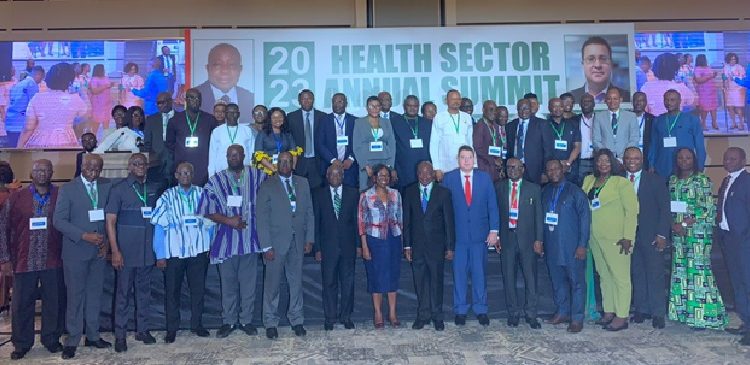Kwaku Agyeman-Manu with MoH directors and Development partners
Development Partners (DP) Lead, Foreign, Commonwealth and Development Office (FCDO) Uzoamaka Gilpin, has called for a more sustainable domestic health financing to help address stockouts of essential medicines.
Speaking at the 2023 Health Summit in Accra, Mrs. Gilpin expressed DPs deep concern about stockouts of essential medicines, HIV, TB and Malaria commodities and medicines, family planning commodities and other sexual reproductive health commodities and routine childhood vaccines.
“These are central to delivery of quality primary healthcare services and without them, health workers are placed in a difficult and untenable position,” she said.
She indicated that underpinning the stockouts is the reduced and delayed flow of funds to the NHIS to reimburse healthcare service providers, both in the public and private sectors.
“With Ghana currently spending less than the Sub Saharan average on goods and operations, greater protection for the government’s health sector budget is required.
We call on the government to protect the NHIS and prioritise sustainable domestic financing for procurement of health commodities and essential medicines including vaccines. We as development partners stand ready to work with the Ministry of health to provide technical support to realize this vision,” she said.
The 2023 Annual Health Summit is on the theme: “Sustainable Financing for Primary Health Care (PHC) towards Attaining of Universal Health Coverage in Ghana; the role of stakeholders”. For three days, stakeholders in the health sector have the opportunity to review the sector’s performance in the previous year and redefine health priorities for the next programme of work.
The Minister for Health, Kwaku Agyeman-Manu, said adequate financing for the health sector would ensure a better, responsive and resilient health system hence the need for a health sector financing strategy.
He said despite the challenges of year 2022, the health sector remained relatively stable in terms of its interventions and corresponding outputs, outcomes, and impacts.
“The year saw a decline in the institutional maternal mortality ratio from 119.6 in 2021 to 102.6 in 2022, however, Ashanti, Greater Accra and Eastern regions recorded high maternal mortality ratios. So, there is an urgent need to support these regions to address the possible contributory factors,” he said.
“We must strengthen our collaboration with other MMDAs under the Health-In-All policies principle to mobilise resources to address issues hindering the delivery of PHC in line with our National Health Policy,” he added.
Mr Pierre Laporte, Country Director, Ghana World Bank, said though Ghana had made notable progress in building human capital during the period, some segments of the population were being left behind.
He said the health sector service delivery gap would require innovative sustainable financing of the primary healthcare system.
By Jamila Akweley Okertchiri


